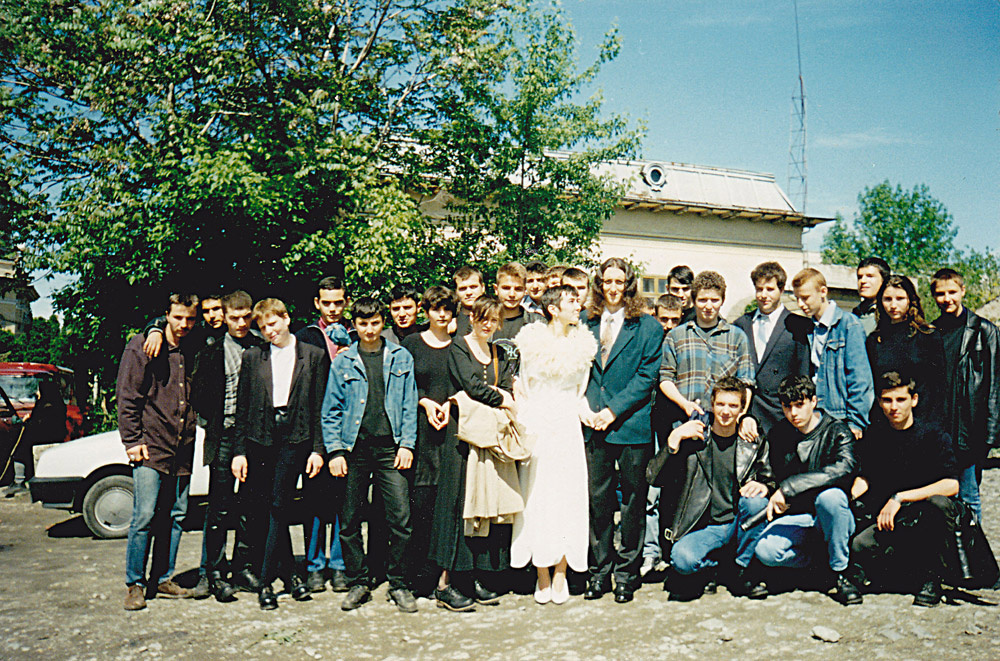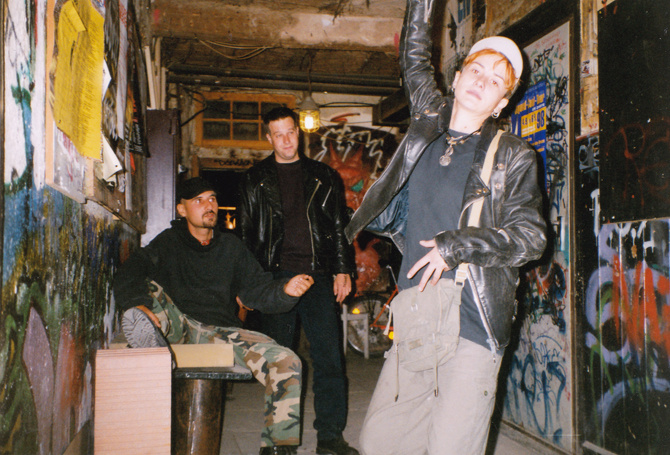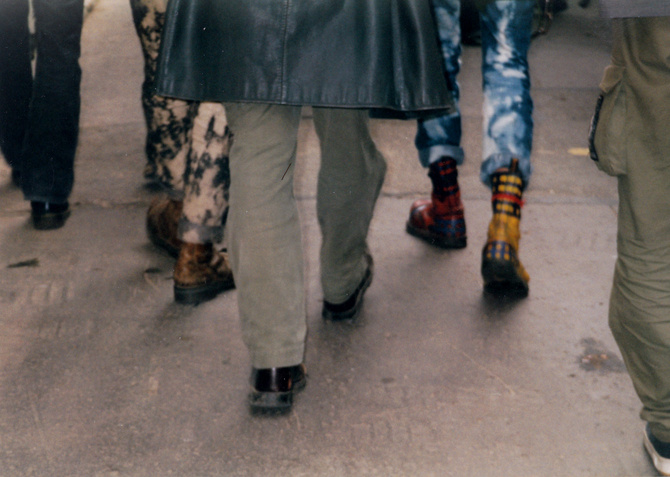I've lived in Romania my whole life, yet I'd always thought that punk only reached the country after the fall of Communism in 1989. Then I heard about an exhibition by the name of Punk, Ash and Holocaust taking place in the southwest Romanian town of Craiova. Turns out it was the birthplace of punk in Romania, and sheltered a thousand-strong punk community in the late 80s, which flourished through the 90s until globalisation got the better of us.
Advertisement
Curious to find out more, I had a conversation with a guy who referred to himself as "Antipro", the name of one of the bands that emerged from the scene later on in the 90s. He didn't want to share his real name, but he was one of the OGs of the Craiovan punk scene.VICE: How did the punk movement reach Craiova?
Antipro: Before the fall of Communism in Craiova, there was a small number of people with more liberal tendencies, who identified with how expressive punk music was. Initially, it was just seven or eight teenagers – they would listen to punk, get weird haircuts and don military apparel. The rest of us were drawn to them out of curiosity. Later on, we got into trading music, recorded off of Serbian radios. The secret police followed some of us, some were interrogated and tortured. Once the 90s arrived, it got easier to move around, so we did. Craiova is small, so it was only natural that we'd stand out. Then Bucharest followed suit.
Antipro: Before the fall of Communism in Craiova, there was a small number of people with more liberal tendencies, who identified with how expressive punk music was. Initially, it was just seven or eight teenagers – they would listen to punk, get weird haircuts and don military apparel. The rest of us were drawn to them out of curiosity. Later on, we got into trading music, recorded off of Serbian radios. The secret police followed some of us, some were interrogated and tortured. Once the 90s arrived, it got easier to move around, so we did. Craiova is small, so it was only natural that we'd stand out. Then Bucharest followed suit.

How large was your community?
There were about a thousand of us, but not all of us were active. Usually only a few hundred would gather for concerts in Timişoara. The two main Craiovan bands were Terror Art and, later, Antipro. Besides going to concerts, what else did you guys do?
We read a lot and listened to music, but we weren’t just hung up on punk bands like The Exploited, Sex Pistols and Ramones, we also listened to a lot of experimental music. We were constantly looking for new music. We'd write to our friends from different cities and countries asking for music, so it became a sort of a contest to discover new genres and show them to your buddies. Where did you guys hang out?
Before the fall of Communism, I think the older punks met inside the local post office during the day. With the 90s came a few bars and we even had a basement where we'd throw parties. After that we just grew and grew – in 1994 we counted hundreds of members.
There were about a thousand of us, but not all of us were active. Usually only a few hundred would gather for concerts in Timişoara. The two main Craiovan bands were Terror Art and, later, Antipro. Besides going to concerts, what else did you guys do?
We read a lot and listened to music, but we weren’t just hung up on punk bands like The Exploited, Sex Pistols and Ramones, we also listened to a lot of experimental music. We were constantly looking for new music. We'd write to our friends from different cities and countries asking for music, so it became a sort of a contest to discover new genres and show them to your buddies. Where did you guys hang out?
Before the fall of Communism, I think the older punks met inside the local post office during the day. With the 90s came a few bars and we even had a basement where we'd throw parties. After that we just grew and grew – in 1994 we counted hundreds of members.
Advertisement

Did you face any problems because of the way you dressed?
Our group was pretty well known in the city, so we didn’t really have any troubles because people avoided us. Personally, nothing ever happened to me. There were some people who liked to talk shit about us, but I never got in trouble because of my clothes. You can’t even say that we were against the mainstream culture, because at the time there wasn't really a mainstream culture. We were trying to invent one.Anyway, our group was more of a debate club. Many of us had philosophy degrees and we quarrelled every day about the notions of society and life. Some went abroad to get their Ph.Ds. A few moved to Germany. Is that how the punk movement ended, with everybody leaving abroad to study?
It was probably to do with the changes that hit Romanian society. In 1995, the channel Pro TV was formed and hit the market with aggressive journalism and manipulation. They launched a campaign to disseminate false information about the punks from Craiova, saying we were Satanists. Things just spiralled out of control when the Romanian secret service actually started following us and searching our homes for proof of that.We protested against this and explained that we had nothing to do with the bullshit they accused us of. Fortunately, the people of Craiova knew us well enough and defended us to the local media and the authorities.
Our group was pretty well known in the city, so we didn’t really have any troubles because people avoided us. Personally, nothing ever happened to me. There were some people who liked to talk shit about us, but I never got in trouble because of my clothes. You can’t even say that we were against the mainstream culture, because at the time there wasn't really a mainstream culture. We were trying to invent one.Anyway, our group was more of a debate club. Many of us had philosophy degrees and we quarrelled every day about the notions of society and life. Some went abroad to get their Ph.Ds. A few moved to Germany. Is that how the punk movement ended, with everybody leaving abroad to study?
It was probably to do with the changes that hit Romanian society. In 1995, the channel Pro TV was formed and hit the market with aggressive journalism and manipulation. They launched a campaign to disseminate false information about the punks from Craiova, saying we were Satanists. Things just spiralled out of control when the Romanian secret service actually started following us and searching our homes for proof of that.We protested against this and explained that we had nothing to do with the bullshit they accused us of. Fortunately, the people of Craiova knew us well enough and defended us to the local media and the authorities.

What do you think stopped the next generation of teenagers in Craiova listening to punk?
It wasn’t about the music, that was just the pretext for us to hang out. I don’t know how the next generation hung out, or if the idea of punk is even relevant to the present. Back then, public spaces still belonged to the public. They hadn't been swallowed up by big businesses and chain restaurants and bars. So what links Romanian punk to British and American punk?
I don’t think the punks from Craiova were similar to the British and American ones. Eastern European punk had its peculiarities. Even though the punk movement had a leftist orientation in the countries where it took shape, we were sick and tired of the political left. We'd had the experience of the Communist left and we'd had enough of it.
It wasn’t about the music, that was just the pretext for us to hang out. I don’t know how the next generation hung out, or if the idea of punk is even relevant to the present. Back then, public spaces still belonged to the public. They hadn't been swallowed up by big businesses and chain restaurants and bars. So what links Romanian punk to British and American punk?
I don’t think the punks from Craiova were similar to the British and American ones. Eastern European punk had its peculiarities. Even though the punk movement had a leftist orientation in the countries where it took shape, we were sick and tired of the political left. We'd had the experience of the Communist left and we'd had enough of it.
Advertisement
